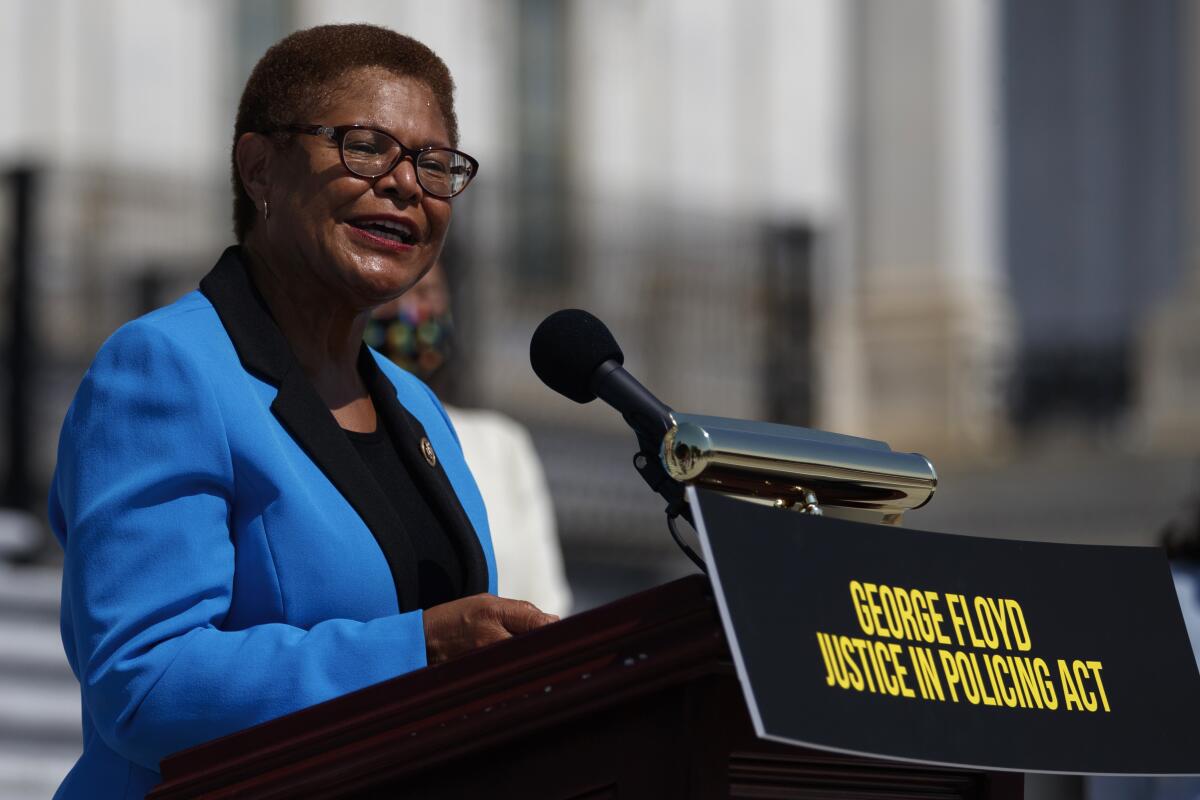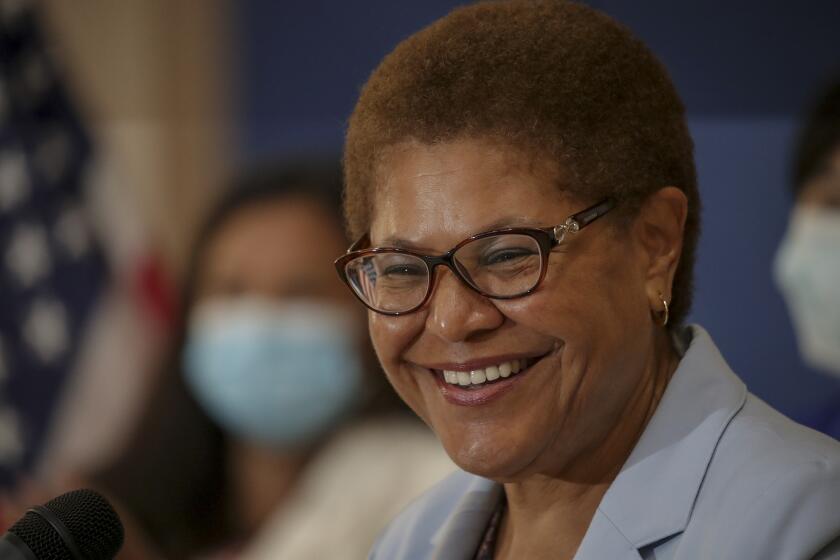After police reform talks fail, Karen Bass discusses what’s next, and her message to George Floyd’s family

- Share via
WASHINGTON — As Rep. Karen Bass (D-Los Angeles) turns to the next chapter of her political career — a run for L.A. mayor, according to sources familiar with her plans — the congresswoman spoke to the Los Angeles Times about the end of her latest one: an unsuccessful push for police reform.
Lead negotiators in Congress pulled the plug on talks earlier this week, conceding that after months of discussions, Senate Democrats and Republicans were unable to reconcile their differences and send a “transformative” bipartisan bill to President Biden’s desk.
The effort launched after the 2020 murder of George Floyd by a Minneapolis police officer, one in a string of killings of unarmed Black men by police that triggered nationwide racial justice protests.
Though House Democrats twice passed their George Floyd Justice in Policing Act, Senate inaction means the federal government is unlikely to enact new laws to improve policing practices over the next 15 months, even as Democrats narrowly control the House and Senate with Biden in the White House.
Below is a transcript of Thursday’s interview with Bass, lightly edited for clarity:
LAT: Police reform talks formally ended on Wednesday. Could you take me through the moment you found out, what you were doing and how that realization made you feel?
BASS: Well, you know I’ve been a part of the process. So I was with Sen. [Cory] Booker and Sen. [Tim] Scott Monday. Monday was our last meeting, and basically Sen. Booker had several proposals — I think it was maybe seven or eight — and it was like the last and final offer. And I agreed with those.
And so we gave those to Sen. Scott, and it was just a brief discussion, but we told him, he should go back and he should think about them…. But Sen. Booker called him yesterday and said, ‘We’re not going to get anywhere,’ because [Booker] could not accept any changes to what he gave. It was the last, final offer. And if Tim could not accept that, then from Booker’s perspective, and mine, too, it actually would’ve been moving the needle backwards. We wanted the legislation to be transformative. We understood it wasn’t going to be transformative. What was transformative was what we passed here in the House, the George Floyd Justice in Policing Act. That was transformative. The compromises that had been made over in the Senate were going move the needle forward. But it wasn’t going to be transformative. It’s sad. But at this point, I just felt like we were just running around in circles and we were never going to get to yes on anything. And so I think it’s important to recognize when you cannot go further and to close. And that’s what he did.
The addition of Rep. Karen Bass to the L.A. mayor’s race would deliver another shakeup to a contest that had been a sleepy affair for much of the last year.
How did the realization [come?] You guys had put so much work into this. After George Floyd’s death there was so much optimism [about the chances of passing reform].
To me, that realization has been there for a while. So actually, the ending was anticlimactic.
There are still 15-plus months of this Congress. Is there a strategy behind announcing that the talks are over formally?
No, the Congressional Black Caucus is evaluating it. And so we will see what we do moving forward. But the main thing that Sen. Booker and I did was [we] called on the administration to use the full power of the White House to move the needle forward where we weren’t able to.
I read your statement calling on the Biden administration to do that. You also mentioned that there needed to be a reengagement of the legislative process. So when it comes to a Plan B, is that Plan B? For President Biden to take executive action? Or is it for the Congressional Black Caucus to come up with another policy? All of the above?
Well, Plan B is for the administration to act at the full weight of its power. The Congressional Black Caucus is going to decide what to do, and I have to leave it at that because it’s left up to the caucus.
Have you had any conversations with President Biden about police reform since Wednesday’s announcement?
(Shakes head no)
You haven’t? So this process was led by you in the House and two Black men in the Senate that you mentioned, Cory Booker and Tim Scott. How much of a factor was race and lived experiences when it came to these tense negotiations?
Well, you had three African Americans who have all experienced harassment at the hands of the police. It’s part of all of our experiences. Most of the time, the press talks about the experience that Black men have, but Black women have experiences also. So I feel that the three of us felt the full weight from all of our communities on us, and it’s deeply sad and troubling that we were not able to deliver. Again, in the House, we delivered. But it takes two houses for there to be law. But it is important to recognize where you do succeed, and we did succeed in the House.
Does the fact that this deal wasn’t able to get done illustrate how much more work needs to be done to diversify what Congress looks like, particularly in the Senate, where you mentioned that this fell short?
Well, yes, diversity is key. But changing the rules of the Senate is also key. So the Senate should function like the House, based on [simple] majority. We’re able to get things done [in the House] because we can pass it on the majority. In the Senate, you need the supermajority, so the majority is not good enough. Diversity’s not going to help that. Well, maybe it would, actually. Maybe it would. I mean, look, it’s not just a matter of what you look like. It’s a matter of what you believe in and what your politics are.
So in the aftermath of George Floyd’s murder, we still have no new federal laws [to reform policing]. Did the optimism or confidence that people had in that moment blind them into thinking a deal may be easier to get than in reality?
No, no, no, no, no. I think if we had been able to act at the height of the response in the streets, we might’ve been more successful. If you take too long, you lose momentum. In this case, momentum flipped in the opposite direction, and especially during the campaign last year, when Republicans used the big lie of ‘defund the police.’ Then that definitely did damage in terms of saying the reason why crime has increased is because Democrats want to defund the police, which, I say it’s the big lie because Democrats did not say that. And had the George Floyd Justice in Policing Act been signed by President Biden, it would’ve provided hundreds of millions of dollars for the police, because if you’re going to tell the police to be accountable and to have databases and to do training and all of that, you have to pay for it.
You mentioned having already had a feeling that the talks were dead. When did you first get the sense that this deal was something that could fall apart? Like was it months ago? Was it last year?
Well, when you don’t get to yes on anything, after a while ... I mean, there were a lot of components to the bill. … I could see if you could get to yes on 10 and you have 10 outstanding. But if you can’t say yes about anything, no matter how compromised it is, then you begin to wonder.
What’s your message to the Floyd family?
My message to the Floyd family is I’m profoundly sad and sorry that we were not able to deliver the change that is needed.
Do you feel responsible at all for the failure to clinch a deal? Like do you feel like this is something that could stain your legacy or Cory Booker’s legacy or Tim Scott’s legacy?
I could care less about that. What I care about is the fact that on any given day about three people die at the hands of the police. That’s what I care about. I care about delivering for my community. I care about doing everything I can to prevent the deaths of people or the abuse of people. I’m not concerned about the other — at all.
What, in your mind, would it have taken for a deal to materialize and become law?
Well, both parties have to want to get across the finish line.
You don’t believe that the Republican Party wanted to get to the finish line on this?
Well, like I said, I couldn’t get to yes on anything, so….
More to Read
Get the L.A. Times Politics newsletter
Deeply reported insights into legislation, politics and policy from Sacramento, Washington and beyond. In your inbox three times per week.
You may occasionally receive promotional content from the Los Angeles Times.












